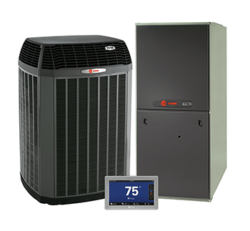Frequently Asked Questions
Cooling Systems
What are the common signs that my air conditioning system needs repair?
You may notice warm air blowing through registers, insufficient airflow, short-cycling, water leaks, or unusual noises. You may also feel higher indoor humidity or smell noxious odors.
How often should I have my air conditioning system serviced to prevent the need for repairs?
You should have your AC serviced annually, ideally in the spring before the summer heat arrives. For optimal protection, you may schedule a second appointment in the fall.
How long does it take to install an AC unit?
It takes roughly four to eight hours to install a central air conditioner system and four to six hours to install a ductless mini-split.
Do I need to hire a professional to install my AC unit?
Absolutely! A licensed and insured HVAC technician can perform the task quickly and effectively. Most importantly, a professional will ensure the unit is properly leveled, secured, and connected.
Heating Systems
What are the common signs that my furnace needs repair?
Common signs you need heating system repairs include increased utility bills, yellow pilot light, odd noises/sounds, inconsistent heating capacity, short-cycling, frequently tripped breakers, and difficulty starting the furnace.
Can I perform furnace repairs myself, or should I hire a professional?
Never attempt to repair your own furnace. Furnace systems are complex machines, and there’s a significant risk of electrical injury, gas leaks, and fire. There’s a reason all furnace technicians must complete extensive training to obtain certification, and your safety isn’t worth the savings you seek by servicing your own system.
How long will my furnace last?
With proper care and maintenance, a gas furnace can last 15 to 20 years, while an electric furnace can last 20 to 30 years.
Should I install a CO detector near my furnace?
If you have a gas furnace, you should install a CO detector in the furnace room. This will notify you if there’s ever a natural gas leak.
How often does my furnace require maintenance?
Like your air conditioner, your furnace should be serviced annually. During a service appointment, the technician will calibrate the thermostat, lubricate moving components, test system functions, inspect components for signs of damage, change air filters, and perform other manufacturer-recommended tasks.
Heat Pumps
What is a heat pump, and how does it work?
Air source heat pumps extract heat from surrounding air, while geothermal heat pumps extract it from below the ground. When cooling your home, it absorbs heat from the interior and circulates it to the outdoor unit; in the winter, the flow is reversed.
Are heat pumps energy-efficient?
Heat pumps offer exceptional energy efficiency. They’re among the most energy-efficient heating/cooling options available and are effective at considerably reducing your utility bills and environmental footprint.
How often does a heat pump require service?
Annual maintenance is recommended. During a maintenance appointment, we’ll inspect electrical terminals, tighten connections, clean the unit, lubricate moving components, inspect/replace belts as required, calibrate the thermostat, and more.
How long does a heat pump last?
Most heat pumps last around 15 years, while some last 20 to 25 years. As with all HVAC systems, longevity is determined by the quality of manufacture, attention to maintenance, and performance of prompt repairs when problems arise.
What are the signs of heat pump failure?
Grinding noises, buzzing, humming, or squealing are common signs of failure. Other indications include icing over in winter or summer, short-cycling, diminished efficiency, or the blower stops circulating air.
Ductless Mini-Splits
What is a ductless mini-split system?
Ductless mini-splits consist of an outdoor and indoor unit connected by refrigerant tubes and electrical wires.
How does a ductless mini-split system work?
Ductless mini-splits operate similarly to central air conditioner systems. The primary difference is that instead of pushing treated air through ductwork, the ductless mini-split blows the air directly into the room where it’s installed.
What are the benefits of a ductless mini-split system?
Ductless mini-splits are energy-efficient and reliable. Their design means that there’s minimal loss of treated air, and most ductless mini-splits are configured to provide cool air in the summer and hot air in the winter.
How often does my ductless mini-split require service?
We recommend annual service for all ductless mini-splits. During a service appointment, the technician will check refrigerant levels, change/clean air filters, lubricate moving components, check electrical connections, and perform a full range of additional maintenance procedures.
Is it worth it to zone my ductless mini-splits?
Most definitely! Ductless mini-splits are ideal for creating comfort zones. This can help enhance your comfort, reduce your utility bills, customize the temperature in each room, and makes it easy to “shut down” rooms when not in use.

